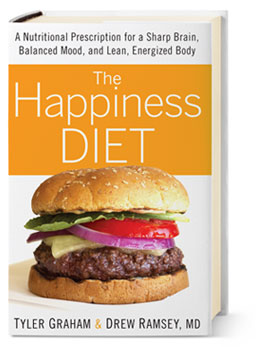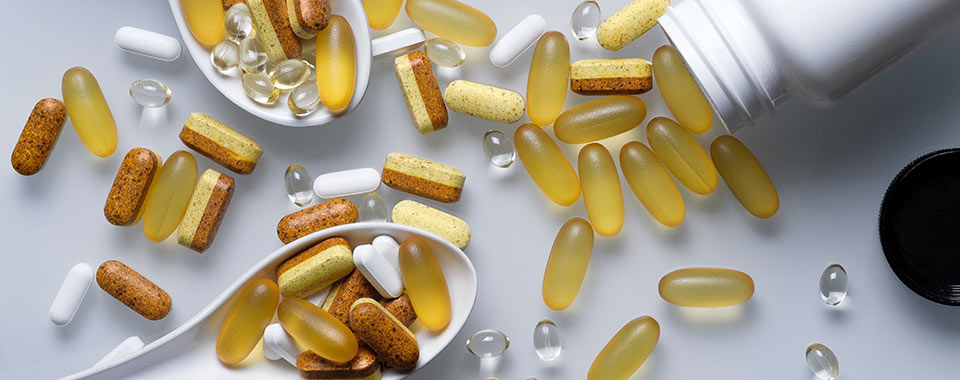What is poor mood health is a food-borne illness?
No, not like Salmonella or E. coli.
But a love affair with junk food and fast food could be a culprit.

This is not a book review, but I wish they’d tossed the buns from the cover photo. Eat what’s in between. Most wheat flour-based foods are highly processed carbohydrates, often with high fructose corn syrup worked into the recipe. Wheat is NOT a mind-friendly food…but I digress.
Still, the message of the book is to avoid sugar, processed foods, refined carbohydrates and industrial vegetable oils (corn, soy, sunflower, safflower, peanut, canola oils.)
If you read this blog regularly, this advice must sound very familiar. Every successful diet tells you to avoid these things, even superficially contradictory ones like Atkins and Ornish.
Kicking fat-phobia to the curb
Fat-phobia and poor mood health go hand-in-hand – mostly because fatty foods like eggs are chock full of brain-friendly nutrients. The authors spend quite a few pages discussing the importance of Omega-3 and other healthy fats for mood.
They urge you to choose whole foods:
- Wild salmon
- Kale
- Broccoli
- Butter
- Grass-fed meats
- Yogurt
- Full-fat milk
- Bacon
- Eggs
I’d add grass-fed beef liver to the list. Not your cup o’ tea? May be you’re a vegetarian? Or the Grand Poobah of nutritional pecking order – gasp! – a vegan!
It’s dang near impossible to get enough B-vitamins, especially B12, from plant sources. And B12 is key to a happy noggin.
I spend a lot of time on the phone talking to people about health – I know how hard it is to change diet and eating habits.
One parent’s struggle…
This is not about mood, but it applies.
I was recently speaking to a woman whose 14-year old son had severe ADHD. She has to hold his arm tightly while walking along streets. Otherwise, he’d run out in front of cars. She was sure that one of these days he’d break loose from her grip and run into an intersection. She desperately wanted help. Of course, I told her to get him looked at by a doctor and get him on meds. She’d already done that and it wasn’t helping. She was calling me to find out which supplements to take.
Instead of talking about supplements, I talked to her at length about about diet – several elimination diets have shown to reduce ADHD symptoms. More here and here.
She was rather quiet. I felt I hadn’t gotten through. So a few weeks later, I followed up to find out if she was noticing any behavior changes. She hesitated and simply said ‘diet changes are too hard.’
But harder than what? Harder than having to grip a teenage boy’s hand to keep him from jumping in front of a car every time he is in public?
She just wanted a pill.
Change is difficult and uncomfortable. I know folks with diabetes who openly say they’d rather live shorter lives than give up sugar.
Supplements, the wobbly crutch
No supplement cocktail can outrun bad diets and lifestyles.
And supplements by themselves may not be effective at supporting mood health*.
After all that, you might be fooled into thinking that Omega-3 deficiency is the root of all evil.
It isn’t.
Poor mood could be triggered by many factors:
- Genetics
- Conflict
- Substance abuse
- Stress
- Loss
- Some medications
- Chronic pain
- Lack of sleep
- Nutritional deficiency
- Food intolerance/allergies
- trauma (physical and/or emotional)
No amount of Omega-3 or other supplements will help you if the root cause of your condition was not nutrition related.
But if your mood is nutrition related, then shifting to a healthy diet may ‘move the needle’ enough to tell you that you need to focus on diet.*
Ruling out nutritional deficiencies first (before getting out the prescription stuff) is the smart safe thing to do. And it’s relatively easy with a healthy diet and supplements.
In addition to Omega-3, mood is also linked to deficiencies in other nutrients including:*
We’ll get into each of these in detail in the next blog.
*Individual results will vary. Nutritional therapy may only help support positive mood if poor nutrition (and associated deficiencies) was a preexisting condition. These statements have not been evaluated by the Food and Drug Administration. This product is not intended to diagnose, treat, cure, or prevent any disease. Research suggests that improving omega-3 fat intake from a concentrated source may help support a healthy mood. Some, but not all studies, indicate that 2,000 mg of omega-3 fats daily with a higher concentration of EPA may offer benefit.



Great article. Looking forward to reading all the rest of this series, as I’ve struggled all my life with it. I’m genetically “loaded” as my therapist says, and have endured several traumas. I also fought cancer twice, all while eating a very healthy, colourful and fairly paleo diet, being very physically active and engaged in creative pursuits. I’m already noticing the benefits of Omega 3 and magnesium, and just ordered Omegavia this evening. Looking forward to observing and experiencing the results of switching to a higher EPA ratio. I found this site when I saw the page on the “Top supplements for mood.” Excellent info and advice there. Many thanks.
Thank you, Larissa. I can relate to being ‘genetically loaded.’ It’s part of what drives my passion for all this. If you are genetically loaded, remember that diet and lifestyle (sleep, stress management, exercise and socializing) are factors that pull the trigger. So we do have some degree of control over our destiny.
Hi Shirlene – yes, a LOT of our customers take OmegaVia and OmegaVia EPA 500 just for these reasons. More often than not, there are dietary and lifestyle causes for depression and anxiety. Taking Omega-3 alone may not help if you are still deficient in other nutrients, physical activity and exposure to sunshine. With depression or anxiety, low-grain may not be enough – sometimes you may need to eliminate gluten/wheat completely. Go 100% wheat free and gluten free for a month and see if you notice any differences. More here: http://www.omegavia.com/supplements-for-depression-anxiety/
Hi do you have an opinion regarding Rebody’s Safron Hunger caps? They have 88.5 mg satieral saffron extract and although they are marketed for weightloss the claim is to also help with depression?
Hi Diane – Satiereal only has a tiny bit of research for mood. I’d like to see more. Eat a Zone or Paleo type diet.